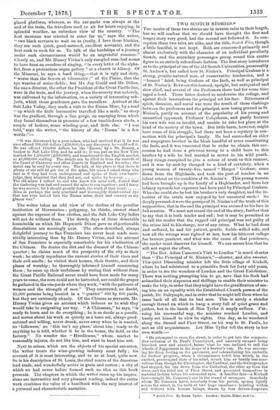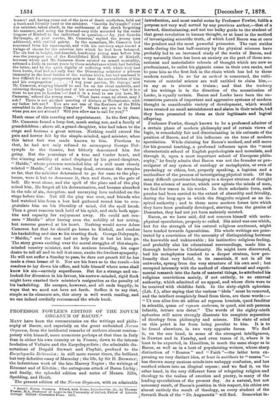TWO SCOTCH STORIES.*
DIE merits of these two stories are in inverse ratio to their length, but we will confess that we should have thought the first and
longer story very good, had the second not followed it. In con- ception these two tales are alike, and the title, Scotch Firs, though a little fanciful, is not inapt. Both are concerned primarily and almost exclusively with the character of an individual peculiarly Scotch, and the secondary personages group round this centre figure in an entirely subordinate fashion. The first story introduces us to the principal of one of the old Scotch Universities, presumably St. Andrew's, but called here St. Ninian's. Principal Graham is a strong, granite-natured man, of conservative tendencies, and a " bonnet" laird, being Graham of the Inch, as well as principal of St. Ninian's. Between this learned, upright, but antiquated and slow chief, and several of the Professors there had for some time raged a feud. These latter desired to modernise the college, and against their innovations the principal set his face. Bitterness of spirit, disunion, and social war were the result of these claahings between the professors and the principal, now losing ground in St Ninian's, partly on account of the popularity of his young and unmarried opponent, Professor Colquhoun, and partly because his own wife was an invalid, and unable to take her place at the head of the society of the town. But little harm, however, might have come of this struggle, had there not been a mystery in con- nection with the principal's family. He had succeeded an elder and scapegrace brother in the bleak handful of acres constituting the Inch, and it was rumoured that in order to obtain this suc- cession he had done a grievous wrong to a child born to this brother by a wife he had married in secret in his wild youth. Many things conspired to give a colour of truth to this rumour, and it was by-and-by changed to a kind of certainty, when a young woman of twenty-five, named " Marget " Graham, came down from the Highlands, and took the post of teacher in an infant school on the outskirts of St. Ninian's. This young woman had been brought up in the family of a Highlander, and from her infancy upwards her expenses had been paid by Principal Graham. Who else could she be but his brother's only daughter, and the in- heritor of the estate now enjoyed by her unnatural uncle ? So deeply persuaded were the gossips of St. Ninian's of the truth of this supposition, that in the end the principal was accused to his face in full senatus. We must not reveal the end of the story, further than to say that it is both tender and sad ; but it may be permitted us to tell the reader that the rugged old principal was not guilty of the crime laid to his charge, nor of any crime. What he had done and suffered, he and his patient, gentle, feeble-willed wife, and how all the wrongs were righted at last, how his bitterest college foe became penitent, and what was the cause of that penitence, the reader must discover for himself. We can assure him that he will not regret the effort.
"The Rev. Adam Cameron's Visit to London " is much shorter than " The Principal of St. Ninian's,"—shorter, and also sweeter. This quiet Dissenting minister left the little village of Kinkell, where he had ministered to a primitive flock for forty odd years, in order to see the wonders of London and the Great Exhibition. There was nothing prompting him to go, save that his flock had subscribed their sixpences and shillings to enable their minister to make the trip, in order that they might have the gratification of see- ing him on an equality with the Established-Church parson of the parish, Dr. Dalrymple, and in order that he might tell them when he came back of all that he had seen. This is surely a slender enough thread on which to hang a story full of quiet grace and pathos, but in the bands of Miss Tytler it amply suffices. Pur- suing his uneventful way, the minister reached London, and busily set himself to view its sights. One day, as he wandered along the Strand and Fleet Street, on his way to St. Paul's, he met an old acquaintance. Let Miss Tytler tell the story in her own words :-
" He attempted to cross the street, in order to get into the compara- tive seclusion of St. Paul's Churchyard, and narrowly escaped being knocked over and crushed, before what be was inclined to call the wheels of Juggernaut in the shape of a brewer's van. He was recover- ing his dizzy footing on the pavement, and rebrandishing his umbrella for further progress, when a circumstance befell him which, in the excited, preoccupied state of his mind, struck him as hardly lass mar. vellous than though Sir Christopher, the Cardinal, and the lexicographer had stepped, the one down from the Cathedral, the other up from the river, and the third out of Fleet Street, and presented themselves in material fashion before his astounded eyes. A familiar face—a Kinkell face—caught Mr•. Cameron's eye in the crowd of strangers. Somebody whom Mr. Cameron knew, somebody from his parish, sprang lightly across the street, in the teeth of two huge omnibuses bristling within and without with human beings, drawn by four driven-desperate • Scotch Firs. By Sarah Tytler. London : Smith, Elder, and Co. horses! and, having come out of the jaws of death scatheless, held out a frank and friendly hand to the minister. ' Geordie Da'rymple cried tie minister, taken aback, in the suddenness of the shock forgetting his manners, and using the free-and-easy title accorded by the ruder tongues of Kinkell to the individual in question.—' Ay, just Geordie Da'rymple, at your service, Mr. Cameron,' replied the young man addressed, with cordial gaiety. In the meantime, Mr. Cameron had reoovered from his amazement, and with his recovery expe•ioneed a twinge of shame for the solecism into which he had been betrayed. The six feet in height, red-bearded, handsome young man before him was the youngest son of the Established Kirk Minister of Kinkell, between whom and Mr. Cameron there existed an armed neutrality, softened a little in recent years by those misfortunes which bad befallen the latter, and by the quiet dignity of suffering with which they had been borne, that had not only lent the Dissenting minister a piteous immunity in the local battles of the various kirks, but had rendered it less difficult for more prosperous men to bear the contradiction of him and his congregation ' I beg your par,lon, Mr. George,' said Mr. Cameron, swaying himself to and fro on his stout umbrella, and colouring through the brick-red of his country sun-burn, ' but it is a treat to see you in London.'—' And it is a treat to see you here, Mr. Cameron,' echoed the young man. What have come up about, may I ask ? There is not another meeting of divines at Westminster, with my father left out ? You are not one of the Revisers of the Bible assembled in the Jerusalem Chamber ? Where are you to be found when you are not abroad ? Will you allow me to call for you?"
Much came of this meeting and appointment. In the first place, Mr. Cameron found a long-lost, much erring son, and a family of grandchildren ; above all, a grand-daughter, who had taken to the stage and become a great actress. Nothing could exceed the
pain and horror felt by the simple-minded, aged minister, when this latter fact was made known to him. Previous to that, he had not only refused to accompany George Dal- rymple to the theatre, but bitterly denounced him for going. But the yearnings of a true and tender heart, and the winning nobility of mind displayed by his grand-daughter, "Maidie," whose presence reminded him of a still more closely related " Maidie," of his own, long dead, overcame the scruples so far, that the minister determined to go for once to the play- house, were it but to denounce it, then and there, as the gate of hell. He went alone, and the spell of the place and of the play seized him. He forgot all his determination, and became absorbed in the tale of sin, deception, and unvarying love unfolded on the stage before him. Not till the play was over, and friends who had watched him from a box had gathered round him to con- gratulate him on his liberality of mind, did the spell break. Then a great remorse took hold of his spirit, and stole both appe- tite and capacity for enjoyment away. He could not cen- sure " Maidie " after having seen the nobility of her acting, but remorse gnawed at his heart. Nothing would serve Adam Cameron but that he should go home to Kinkell, and confess his backsliding and sins Ito his trusting flock. George Dalrymple, "Maidie," and the rest had no help for it but let him go.
The story grows exciting over the moral struggles of this simple- minded country minister, and his anxious brooding, his eager desire to tell all and to tell it at once, excite the liveliest sympathy. He will not suffer a Sunday to pass, he dare not preach till he has made a clean breast of it Nor are his fears as to the result—his resolves to lay down his office, and hide himself where none shall know his sin—entirely superfluous. But for a strange and un- looked-for diversion in his favour, his narrow-minded, rigid flock might have exacted their minister's resignation as the penalty of his backsliding. He escapes, however, and all ends happily, in ways that we need not here set forth. Suffice it to say that, simple as its elements are, this story is well worth reading, and we can indeed cordially recommend the whole book.







































 Previous page
Previous page